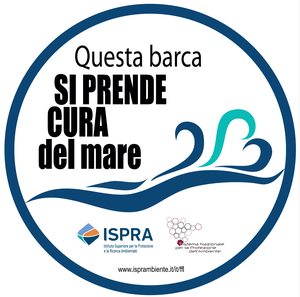This boat takes care of the sea
This boat takes care of the sea" it is the sentence reported on large stickers (30x30cm) that ISPRA gave to some fishermen to show in their boats, as a recognition of their commitment to protect and preserve the marine environment.
Within three European projects, GAP2, DeFishGear, and ML-REPAIR, fishermen from the Adriatic fleet have been collaborating for several years with ISPRA researchers and other institutes, participating in round-tables, sharing information and knowledge and spending time and energy in taking concrete actions, such as in the Fishing for Litter.
Captains and crews of Chioggia’s fleet were the first to obtain the recognition in Italy, followed by the fishermen from the Port of Cesenatico, Cattolica and Molfetta during 2018.
Below the list of captains/owners and fishing vessels involved in the three European projects.
From the Port of Chioggia
- Mario Casson, M/p Furia C
- Cristian Dall’Acqua, M/p Jolly
- Giorgio Fabris, M/p Gionni Alberto
- Denis Padoan, M/p Superbo
- Marino Pagan, M/p Guerriero della luce
- Roberto Penzo M/p Albino Tanfa
- William Perini, M/p Perla Nera
- Doriano Scarpa, M/p Gurra
- Sandro Zennaro, M/p Bufera
- Mauro Maistrello, M/p Mauro II
- Renzo Zennaro
- Roberto Perini , M/p Gulliver
- Diego Padoan, M/p Salvador I°
From the Port of Cesenatico
- Alessandro Brandi, M/p Tiziano I°
- Andrea Tosi, M/p Calimero Sampa
- Claudio Cesarini, M/p Martin Pescatore II
- Massimo Rossi, M/p Rimas
- Massimiliano Subieschi, M/p Azzurra
- Oriano Vignali, M/p Ezi
- Gianni Zavatti, M/p Gabbiano IV°
From the Port of Cattolica
- Filippo Pini, M/p Togo
From the Port of Molfetta
- Luca Binetti , M/p Europa
- Ignazio Salvemini, M/p Giovanni Paolo II
- Alessandro Gadaleta, M/p Luigi Padre
- Domenico Facchini, M/p Marina Domenica
- Paolo Spagnoletta, M/p Marino°
- Antonio Vilardi, M/p Mizar
- Giuseppe Cappelluti, M/p Nuova Carmela Madre
- Cosimo Gadaleta, M/p Diamante
- Domenico Facchini, M/p Morfeo
Fishing for Litter – What it is about
The “Fishing for Litter” is an initiative aimed to encourage the proper disposal on land of solid non-hazardous waste, accidentally caught by fishermen during their normal fishing activities, and discarded fishing gear. The initiative is aimed at reducing the amount of marine litter in our seas, as established by the Marine Strategy Framework Directive (2008/56/CE transposed in Italy by Legislative Decree n. 190/2010), and at increasing knowledge on critical issues related to marine waste encouraging the spread of good practices and promoting a sustainable development in the fisheries sector.
The Fishing for Litter activity is still little-known in Italy and, in this context, fishermen from Chioggia were pioneers of this important initiative in the Mediterranean. The Fishing for Litter scheme is currently recommended by the main International and European Organizations and has recently aroused considerable interest from media and citizens.

Within the European Research Project DeFishGear (Derelict Fishing Gear Management System in the Adriatic Region), a pilot project of Fishing for Litter was conducted by ISPRA in Chioggia during 2015 and 2016 thanks to the collaboration of the Port Authority and the Municipality of Chioggia.
Data, referred to a sixteen months period of activity, were higher than expected: fishermen involved in the project have removed from the seafloor – and safely disposed on land – about 30 tons of waste and 9 tons of discarded fishing gear. Analysis from a random sub-sample of collected waste (1127 kg) showed the predominance of plastic materials in terms of sample weight (79%) and highlighted one of the most relevant issues at the local scale referred to the fishery sector: mussel nets represented 65% in terms of weight of fishing-related waste found at the seafloor in the area.

The European joint research project GAP2 (Bridging the gap between science, stakeholders, and policymakers) supported by the European Community and completed in 2015, involved fishermen of Chioggia in a participatory research activity with ISPRA researchers. Thanks to the valuable collaboration between fishermen and researchers, data on the spatial-temporal distribution of fishery resources in the North Adriatic were collected, and joint management proposals aiming to reduce fishing effort were shared.
The project focused on the monitoring of demersal fisheries in the Veneto Region and an area between 4 and 18 miles from the coast, from the river Po mouth to the Lagoon of Grado and Marano, at the end of the biological rest period, was surveyed.
The valuable collaboration between researchers and fishermen, has led to the drafting of the ISPRA Document “A future for the Northern Adriatic Sea fisheries. Results and proposals from the participatory research project GAP2 involving researchers and fishermen of Chioggia” (available on paper format upon request).

ML-REPAIR (REducing and Preventing, an integrated Approach to Marine Litter Management in the Adriatic Sea) (January 2018 - June 2019) is a European project supported by Italy-Croatia Cross-Border Cooperation Programme, involving seven partners (4 Italians and 3 Croatian) on marine litter issue in the Adriatic Sea.
ML-REPAIR aims at strengthening a joint governance on marine litter management in Italy and Croatia and an environmentally sustainable growth of tourism and the fishery sector in the Adriatic Sea, by promoting actions for reducing and preventing marine pollution, improving the status of the Sea in the medium-long term.
"Within ML-REPAIR, Fishing for Litter initiatives are launched/re-launched in four Italians Ports (Chioggia, Cattolica, Cesenatico and Molfetta) and in nine Croatian Ports (Brižine, Supetar, Vira, Vela Luka, Dubrovnik, Vinišće, Rogoznica, Tribunj, Santa marina) involving about 60 vessels in the two Countries".

